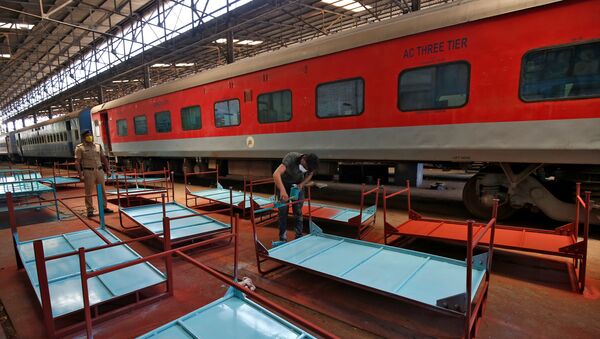From opening COVID-19-dedicated hospitals to making in-house testing kits and ventilators, India has ramped up its healthcare system within the time frame brought by Indian Prime Minister Narendra Modi through a 21-day lockdown.
With only 0.55 beds per 1000 population, government hospital beds were available in India before the pandemic, but the nation is now racing against time to ramp up public hospitals to slow the spread of the deadly COVID-19.
COVID-19-Dedicated Hospitals
India has opened up several hospitals over last few weeks especially to treat COVID-19 patients. The Indian state of Odisha became the first to set up hospitals to treat those infected with the deadly virus. The state’s chief minister, Naveen Patnaik, inaugurated its third hospital, with a capacity of 525 beds, for COVID-19 patients on Monday in the state capital of Bhubaneswar.
Two other hospitals dedicated COVID-19 patients, with 125 beds in Ashwini Hospital in Cuttack city and 200 beds in Rourkela, in collaboration with Hitech Medical College have been opened as well.
India's #Odisha setup Covid-19 dedicated hospital in #Bhubaneswar with 525 bedding capacity. The state has turned out to be an example as it now at 3 dedicated hospitals for #coronavirus. pic.twitter.com/LKJO8mt1WC
— Shweta Sharma (@Ss22Shweta) April 6, 2020
One of India’s richest men, Mukesh Ambani, set up a COVID-19 hospital in Mumbai under the Reliance Foundation.
The 100-bed hospital is equipped with required infrastructure and biomedical equipment such as ventilators, pacemakers, dialysis machines, and patient-monitoring devices.
Similarly, automaker Mercedes-Benz India announced the opening of a temporary hospital with a 1000-bed isolation ward for coronavirus patients in Chakan in Pune, Maharashtra on 1 April.
As the number of COVID-19 cases doubles every four days, India's Ministry of Health Affairs directed 17 out of the 35 states of the country to earmark hospitals dedicated for treatment of coronavirus.
Necessity is the mother of invention
In a landmark development, the first made-in-India coronavirus testing kits were made available to expedite the testing process in the country. Mylab Discovery, located in the western city of Pune, became the first Indian company to get clearance from the Indian Council of Medical Research--the country's apex medical research body-- to manufacture and sell testing kits.
“Kits are being dispatched regularly and we are getting support of the governments, medical bodies, suppliers and logistic partners to deliver to different parts of the country. We are also ramping up our capacity,” Saurabh Gupta, a spokesperson for MyLabs, told Sputnik.
Use what is available
India has not only suspended its rail network, the world's fourth-largest and Asia’s oldest, but also converted old train carriages into isolation wards to use in the event that COVID-19 case numbers rise exponentially.
Indian Railways has converted 2500 carriages into isolation wards, readying almost 40,000 isolation beds for COVID-19 patients. Each carriage is capable of accommodating up to 16 patients, as well as nurses, doctors and medical supplies.
"With the conversion of around 2500 coaches, 40,000 isolation beds are now ready for contingency. On an average, 375 coaches are being converted by Indian Railways in a day. The work is being carried out at 133 locations in the country," stated the railway in a press release.
Indian 🇮🇳 innovative spirit!
— Erik Solheim (@ErikSolheim) March 30, 2020
Compliments to Indian Railways for its novel initiative in converting train coaches into isolation wards for #COVID-19 patients.
It illustrates how new solutions can help us in our fight against #Coronavirus. pic.twitter.com/S72rXs4bok
A reported 51 Indian army hospitals across the country are being used for the treatment of coronavirus patients.
“Dedicated COVID-19 facilities including High Dependency Units, Intensive Care Unit beds are being prepared in 51 hospitals of the armed forces across the country. Some of these facilities are located at Kolkata, Visakhapatnam, Kochi, Dundigal near Hyderabad, Bengaluru, Kanpur, Jaisalmer, Jorhat and Gorakhpur,” the ministry said.
Ventilators
According to doctors, an estimated 5-10 percent of coronavirus patients will require ventilator support. While there is no exact figure to show the number of ventilators available in the public healthcare system, a projection assuming that 50 percent of the intensive care units (ICU) beds have ventilators suggests that India may have as many as 17,850-25,556 ventilators in the country.
According to the government of India, over 14,000 ventilators have been identified in various hospitals across the country that could be used to treat COVID-19 patients.
To meet immediate need and reduce cost, young engineers from India’s top engineering schools are working to develop a low-cost ventilator which could not only save lives during the pandemic but be used in intensive care units on existing patients with other diseases.
While each ventilator costs around INR 150,000 ($1,987; £1,612), the start-up is working to build low-cost homegrown invasive breathing machines.
"Precautionary, Not Alarmed"
India's health ministry and scientists with the country’s top medical research body are facing questions as to whether India has already entered into the community transmission phase. All preparations are being carried out to address projections of millions of positive COVID-19 cases in the coming weeks.
Indian Council of Medical Research head scientist, Dr Raman Gangakhedkar, dismissed international studies, including that by the University of Michigan that suggest India could face between 100,000 to 1.3 million confirmed cases of the deadly coronavirus by mid-May.
“Our preparations are purely precautionary in nature and not anticipatory based on a different study that has been released of late. Our health system is already lacking on many fronts including shortage of hospital beds, ventilators etc. So, ongoing preparations will lend a boost to our healthcare system irrespective of the number of COVID-19 cases India would have to tackle,” Gangakhedkar said.


